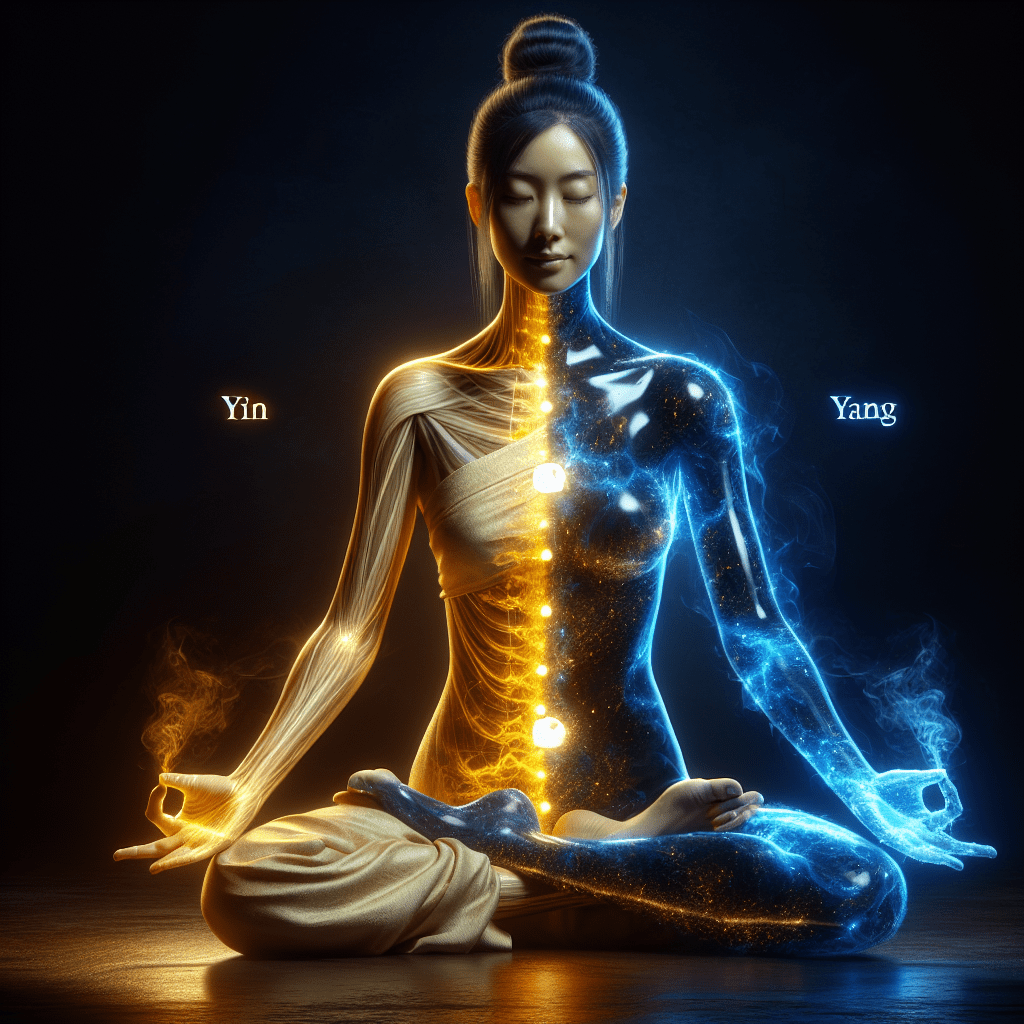Have you ever felt like you’re running on empty one day and bouncing off the walls the next? That mental seesaw might be more than just a mood swing—it could be your Yin and Yang energies crying out for balance.
In Eastern philosophy, Yin and Yang represent the beautiful dance of opposing yet complementary forces that exist within all of us. Like day needs night, and rest needs activity, our minds require a harmonious flow between these energies to function at their best. When these forces are in sync, we experience mental clarity, emotional stability, and a sense of purpose that carries us through life’s challenges. This difference between Yin and Yang creates the foundation for holistic wellness.
Think of Yin as the cool, receptive, inward energy—the quiet moments of reflection, the deep restful sleep, the patience to listen. Yang, on the other hand, is the warm, active, outward energy—the motivation to pursue goals, the enthusiasm for new projects, the drive that gets you through a busy day. Neither is better than the other; both are essential parts of a balanced life.
But in our modern world, finding this delicate equilibrium is becoming increasingly difficult. The constant notifications, endless to-do lists, and society’s celebration of “hustle culture” often push us toward Yang dominance, leaving our Yin energy aspects neglected and depleted. The result? A mental landscape that feels fragmented, exhausted, and somehow still wired all at once.
The Modern Imbalance: Why Balancing Energy Matters More Than Ever
In today’s fast-paced world, Yang energy often dominates our lives. We’re constantly in motion—working, planning, achieving, connecting. Our society rewards action, productivity, and visible results. While this dynamic energy is vital for progress and creation, an overabundance without its complementary Yin counterpart creates systemic imbalance.
“Understanding the yin and yang energetic aspects of emotions can steer us towards mind, body and spirit balance,” explains traditional Eastern medicine practitioners. This balance isn’t just philosophical—it’s practical and essential for our well-being.
When our energies are imbalanced, our emotional and cognitive functions suffer. Too much Yang without sufficient Yin can lead to burnout, anxiety, irritability, and scattered thinking. Conversely, excessive Yin without enough Yang might manifest as lethargy, indecision, lack of motivation, or depression. Finding a balanced mental wellness approach is essential for optimal functioning.
Dr. Ming Chen, an expert in Eastern medicine, describes it this way: “Yin and Yang serve as a reminder that we can actively balance the facets of our lives to create happiness. Without this awareness, we often push ourselves toward one extreme until our bodies and minds force us to correct course—usually through illness or emotional crisis.”
The power of balancing energy comes from recognizing these patterns before they create distress in our lives. By cultivating awareness of our dominant energy at any given time, we can make small adjustments that prevent larger imbalances from taking root. Creating a wellness balance helps harmonize your energy when life gets chaotic.
5 Warning Signs Your Mental Yin-Yang Balance Needs Attention
How do you know if your energies need rebalancing? Your body and mind are constantly communicating their needs—if you know how to listen. Here are five common signs that your Yin-Yang harmony might be disrupted:
1. Persistent Mental Restlessness
Do you find yourself unable to quiet your mind, even when you’re physically exhausted? Perhaps you lie in bed with thoughts racing, planning tomorrow’s activities, or rehashing the day’s events. This mental restlessness—an inability to shift from doing to being—signals Yang excess.
Sarah, a marketing executive and mother of two, recognized this pattern in herself: “I was always mentally ‘on’—planning, worrying, organizing. Even during vacations, I couldn’t relax. My mind was like a computer with too many tabs open, and I couldn’t find the shutdown button.”
2. Emotional Reactivity
When small inconveniences trigger disproportionate emotional responses, your energy balance might be suffering. Yang-dominant imbalances often manifest as irritability, impatience, or quick anger. Yin deficiency removes the cooling, calming influence that helps us respond rather than react.
“I knew something was wrong when I snapped at my partner for loading the dishwasher ‘incorrectly,'” admits Michael, a software developer. “Normally, I’m easy-going, but after months of deadline pressure and minimal downtime, everything felt like an emergency.”
3. Chronic Fatigue Despite Adequate Sleep
Are you getting enough hours of sleep but still waking up tired? This paradoxical exhaustion often indicates Yin deficiency. Without sufficient Yin energy, sleep lacks restorative quality, leaving you drained despite adequate time in bed.
Eastern medicine views this as “empty fire”—when Yang energy continues burning without the nourishing foundation of Yin to support it. The result is a depleted system that can’t properly rejuvenate even when given the opportunity.
4. Loss of Connection to Body Signals
When we’re out of balance, we often lose touch with our body’s basic needs. You might forget to eat until you’re ravenous, ignore the need to use the bathroom until it’s urgent, or push through pain signals until they become debilitating.
This disconnection between mind and body represents a fundamental Yin-Yang imbalance—the receptive, sensing aspect of Yin becomes overwhelmed by the action-oriented Yang drive. The body speaks, but the mind isn’t listening.
5. All-or-Nothing Thinking and Behavior
Do you find yourself swinging between intense productivity and complete collapse? Perhaps you power through projects with laser focus for days, then crash into a weekend where you can barely move from the couch. These dramatic pendulum swings indicate your system is compensating for severe imbalance rather than maintaining sustainable harmony.
“I used to pride myself on my ability to work 14-hour days for weeks at a time,” shares Jamie, a former financial analyst. “Then I’d completely shut down for days, unable to handle even basic tasks. I thought it was normal—just how high achievers operated. Now I understand it was my body desperately trying to restore balance.”
Practical Techniques for Restoring Your Energy Balance
The good news is that Yin-Yang balance can be restored through intentional practices that honor both aspects of our nature. Here are some effective approaches to realign your energies:
Sound Healing for Energy Harmonization
Sound vibrations offer a direct path to energy balancing. Different frequencies affect our nervous system in profound ways, helping to either stimulate or calm our energetic state.
For Yang deficiency (when you feel depleted and unmotivated), try binaural beats in the 14-30 Hz range, which can enhance focus and energy. For Yin deficiency (when you feel wired but tired), deeper tones and frequencies around 4-7 Hz promote relaxation and receptivity.
EASTCHI AI incorporates personalized sound healing recommendations based on your unique energy constitution, suggesting specific frequencies and durations that address your particular imbalance patterns.
Chakra Activation for Energy Flow
In Eastern healing traditions, the body’s energy centers (chakras) serve as gateways for balancing different aspects of our being. When these centers become blocked or overactive, our overall energy balance suffers.
For mental harmony, focus especially on the third eye chakra (associated with intuition and clear thinking) and the crown chakra (connected to higher consciousness). Simple visualization practices can help activate these centers:
Close your eyes and visualize a deep indigo light at the center of your forehead, slowly expanding as you breathe deeply. This practice helps integrate Yin receptivity with Yang clarity, improving decision-making and reducing mental fog.
Breath Alignment Practices
Breath is perhaps the most immediate tool we have for balancing energy. Different breathing patterns can quickly shift our energetic state from Yang-dominant to Yin-dominant or help establish equilibrium between the two. Balance yoga practices offer powerful techniques for energy restoration when you feel drained.
For calming excessive Yang energy, try the 4-7-8 breath: Inhale for 4 counts, hold for 7 counts, and exhale for 8 counts. The extended exhale activates the parasympathetic nervous system, bringing in more Yin quality.
To activate deficient Yang energy, practice the “breath of fire”—rapid, rhythmic breathing through the nose with equal emphasis on inhale and exhale, pumping the abdomen slightly with each breath.
EASTCHI AI’s approach to breath work is particularly effective because it analyzes your Five Element constitutional type to recommend personalized breathing patterns that address your specific imbalances.
Seasonal Dietary Adjustments
What we eat significantly impacts our energy balance. Foods carry their own Yin and Yang properties, which can either exacerbate or help correct our imbalances. Balanced wellness approaches integrate these dietary principles for optimal health.
In Eastern medicine, warming foods (like ginger, cinnamon, and most cooked foods) enhance Yang energy, while cooling foods (like cucumber, watermelon, and raw vegetables) strengthen Yin aspects.
“Food is not just fuel—it’s medicine,” explains HerbalsZen’s nutritional philosophy. “By understanding the energetic properties of different foods and aligning them with your constitutional needs and seasonal changes, you create internal harmony that supports mental balance.”
During winter months, when Yin energy naturally dominates the environment, warming Yang foods help maintain balance. Conversely, cooling Yin foods in summer counterbalance the external Yang energy of the season.
Digital Detox and Nature Immersion
Perhaps nothing depletes our Yin energy faster than constant digital engagement. The continual input, notifications, and mental stimulation create Yang excess that’s difficult to counterbalance. Energy Yin practices can help restore balance in our overactive, digitally saturated world.
Scheduling regular digital detox periods—even just a few hours each week—can help restore Yin receptivity. Combine this with time in natural settings, where the balanced rhythms of nature help reset our internal energetic patterns.
Research shows that even 20 minutes in a natural environment can significantly reduce stress hormones and restore cognitive balance. This practice aligns perfectly with Eastern wisdom that views humans as microcosms of natural energy patterns. Qi balancing techniques further enhance this natural restoration process.
Embracing the Yin-Yang Balance for Lasting Mental Harmony
Balancing energy isn’t a one-time fix but an ongoing practice of awareness and adjustment. Like a skilled sailor constantly trimming sails to changing winds, we can learn to recognize and respond to our energetic needs before major imbalances develop.
“Yin-yang philosophy is a powerful tool for achieving harmony in life,” notes Eastern wellness practitioner Lin Feng. “It teaches us to balance acceptance with action for better mental health.” This integration of traditional Eastern and modern Western approaches creates a comprehensive framework for mental wellbeing.
This balanced approach to wellness forms the foundation of HerbalsZen’s philosophy. Through EASTCHI AI’s integration of ancient wisdom with modern technology, users receive personalized recommendations that honor their unique energetic constitution while addressing current imbalances.
By incorporating even small balancing practices into your daily routine—perhaps a few minutes of breath work in the morning, mindful eating at lunch, or a nature walk before dinner—you begin creating a life that honors both the Yin and Yang aspects of your nature.
Remember that perfect balance isn’t a fixed destination but a dynamic dance of adjustment and flow. Some days will require more Yang energy to meet challenges; others will call for deeper Yin receptivity to process and integrate experiences. The skill lies not in achieving perfect equilibrium but in recognizing which energy needs nourishing in each moment. As the balanced lifestyle approach teaches us, true harmony requires embracing life’s natural fluctuations.
As you become more attuned to your energy patterns, you’ll likely notice improved mental clarity, more stable emotions, better sleep quality, and a deeper sense of purpose and connection. These aren’t just pleasant side effects—they’re the natural expression of a system in harmony, where Yin and Yang dance together in beautiful balance.



